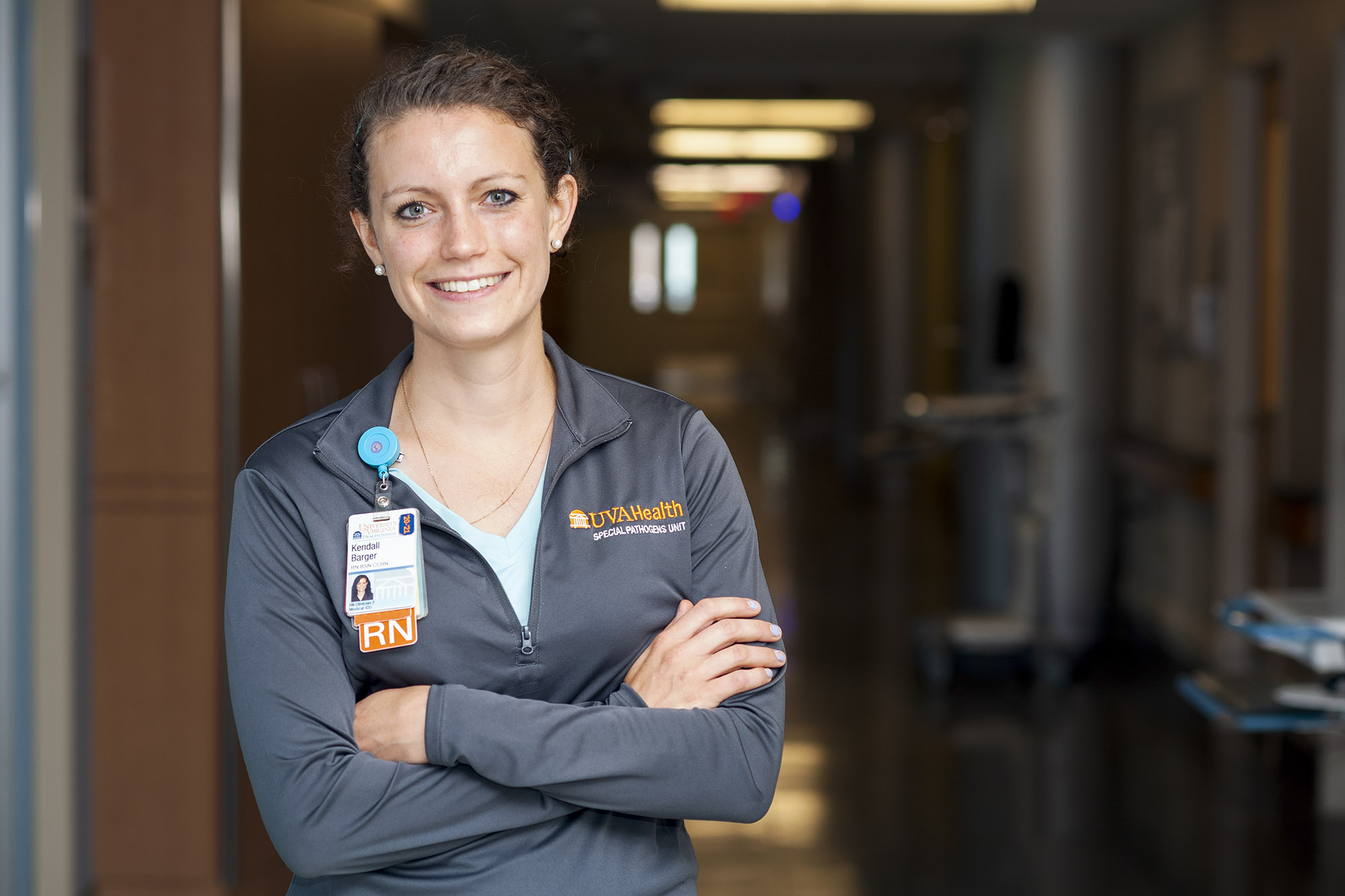These stories are difficult to hear. They come from UVA Health staff who cared for our community’s sickest COVID-19 patients – our parents, relatives, friends, neighbors. They did all they could to save lives, and for some, were there during their last hours.
Weary and emotionally scarred, these nurses and nurse assistants are forever changed, but hopeful. And like heroes on the battlefield, they come away with a profound sense of camaraderie.
As part of their healing, these UVA Health caregivers want to share their stories. Here is the second of a five-part series of firsthand accounts.
Kendall Barger, Nurse, Medical Intensive Care Unit
Every couple of weeks, I’d write down the standout stories. I didn’t have a ton of room to feel things at the time. Writing these stories allowed me to say what I couldn’t have said out loud to anyone. Later, when I went back to read the journal, I just sat there, sobbing at my kitchen table.
I got to the part about ‘Does this mask work?’ and the reality of a time when nurses were dying in Italy. I remember making a distinct choice to put my life up for this.
I’m a nurse. I’m very honored to be a nurse. We did this because we love people, and we care about them, and we had the opportunity to serve.
One of the heart-wrenching things about COVID is lives are lost in isolation. Many of our patients were on the margins of society. Some were undocumented immigrants. These are people the world never knew and will forget. But I could never forget. These are very valuable people who have lost their lives, and their families have lost so much.
People are ready to move on, but we are now just starting to process it all. So our stories are timely, but inconvenient.
Excerpts From Kendall’s Journal
I kept a journal for several months to help me process everything. (Each section is a different day and different family.)
First Day
It was the first day. What does COVID stand for? OK, this mask, does it work?
She can’t breathe; this is bad. She needs to be intubated.
“Did you call your son?” She had cystic fibrosis, and she coughed all the time. I was a close-talker then. Does this mask work? She looks terrible.
“I love you, son.”
“OK, we’ll put your phone over there. Can I hold your hand? We’re going to put this breathing tube in so you can rest. You’re working so hard to breathe.”
We both know she won’t need her phone again. Does this mask work?
Late Winter
It’s a late winter afternoon. The sun is bright against dark green trees when I press my face against the glass looking for the incoming helicopter.
Only minutes later, we slide you from the stretcher into our bed. Your feet are so small. Like a child.
These are the early days. The rumors are so big and scary. The uncertainty lays thick, immovable over us. What we don’t know far outnumbers what we do. But we continue on.
“I remember making a distinct choice to put my life up for this.”
- Kendall Barger
UVA Health medical intensive care unit nurse
We know the basics – stickers here, IVs here. Your oxygen levels are low, scary low. What if you die? You’re barely older than me.
Your feet are so small, like a child. We have this thing called ECMO [extracorporeal membrane oxygenation machine]. We want to save your life. You have kids. One day you’re going to go home to them. I look at your picture on the wall all the time.
A New Day
The physical therapist thinks you can stand up. Your lungs were rocks in your chest. We had five tubes in different parts of your lungs. You lived on the side of death for weeks. You have many surgeries coming for you. But you sat on the side of the bed after months, and I went outside to cry. You live at home with your family now.
The Weekend
It’s the weekend. My stomach hurts. Your husband, he’s back. He parked in the spot directly across from your window. He calls and talks to you, even though you haven’t responded in weeks. He sleeps in his car across from your window, whispering his love to empty seats.
Watching the Last Sunset
Wednesday at 6 p.m., we watched your last sunset. I sat on the trashcan next to your bed and entwined my fingers in yours. You and your mom came in together, but she went home today. Any minute now, you’re going to go, too.
Outside the glass door, and behind another, there are drawers banging shut and supplies hastily passed. But inside these glass walls, it’s quiet. The silence created by sedatives and narcotics mixed with the oranges of sunset and passing time.
Midafternoon
Midafternoon. I averted my eyes from staring. Your bed is moved in front of the window. Your two designated family members are bent over your bed squeezing out every moment of their 60 allotted minutes.
Outside the window, on the top row of the parking deck, more family members stand watching. My coworkers – ever compassionate, kind, gracious, creative – they put up hearts all over the window. So even though the glass separates them, the family knows where she is. They’re gathered so close but so very far away.
My coworker, she gave them everything she had. So much so she couldn’t come back the next day, on the edge of bending without breaking.
For more stories from the front lines, click here.
Media Contact
Article Information
July 23, 2021
/content/voices-covid-unit-read-excerpts-nurses-journal

